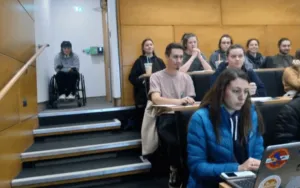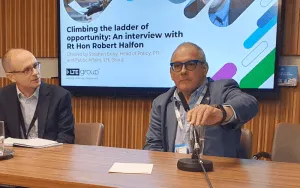One of the country’s leading Paralympians has called on football clubs to do more to improve access for disabled supporters.
Six-time Paralympian Stephen Miller, a founding member of Newcastle United Disabled Supporters Association (NUDSA), said there had been a “massive progression” on access since he started attending football matches.
He said his club’s ground was now one of the most accessible in the country, thanks in part to the influence of NUDSA.
But he said that many other grounds were “still not up to standard”, which was “not acceptable”.
Miller, who has six Paralympic medals in athletics, said: “Sport is well funded, especially elite sport, people make a lot of money and the facilities should reflect that.
“It’s about equality. We shouldn’t accept any more where grounds and facilities are not meeting the standards that they should be meeting.
“There need to be bigger incentives, bigger penalties for the clubs that are not making the effort to embrace disabled supporters.”
Even with his own club, he said, more could still be done, such as improving transport to and from the ground, while buying tickets was “still not the easiest thing in the world for disabled people”.
He added: “Looking at away games, that is a big area as well, how we can improve away facilities for disabled supporters and make disabled supporters feel more comfortable about going to away games.”
He was speaking at an online event organised by the disabled-led campaigning charity Level Playing Field (LPF), which represents disabled fans and is preparing for its 17th annual Weeks of Action event.
Last year’s Weeks of Action campaign was “stopped in its tracks” when its final weekend coincided with the suspension of live sport because of the pandemic crisis.
This year’s event, which aims to highlight good access and inclusion at sports venues across England and Wales, will take place from 27 February to 14 March, and will focus on social media.
One in four Premier League football clubs have already signed up to Weeks of Action, as well as two-fifths of those in the Championship, the second tier of English football, with LPF working with others to join them.
Miller said Weeks of Action was about “raising awareness and the importance of everybody having the opportunity to watch live sport and have that experience.
“I know how much sport has given me in my life, not only competing and training but also going to watch sport and how that can help to build positive experiences.”
He said he was missing the “matchday experience” of live sport during the pandemic, such as “walking around the ground and being in the city centre, meeting friends, meeting family, having all those conversations, that’s what I miss the most.
“That’s why I go to football, for the experience. It’s a day out. It’s fun, it’s social, it’s interaction, that’s really what I miss the most. I think a lot of people are in the same boat.”
He said he was missing being able to “have a pint, talk about the game, put a bet on, have a bit of banter; it’s these little things you miss.
“It’s never the same watching it on the TV when you’re on your own in the house.”
Last June, LPF was the first sports charity to carry out a survey on the impact of COVID-19, surveying nearly 600 disabled sports fans, with 43 per cent of them saying that the suspension of live sport had had a significant impact on their mental health.
Tony Taylor, LPF’s chair, stressed that there had been “huge progress” on disability and access in football, while “huge improvements” were still being made.
He said: “We had a situation where many clubs said to us: ‘We can’t make all these adjustments… it’s not physically possible.’
“The actual reality was that it was possible, and things have changed.”
He told the online event that he had been “really, really pleased” that many clubs and individual players had contacted disabled supporters during the pandemic to check on their welfare.
He said the positive mental and physical health advantages of attending live spots events for disabled supporters was now “missing for so many people”, which was “a great tragedy”.
But he said that access and inclusion must be kept “right at the top of the agenda” and that he hoped the Weeks of Action would show how important the issue is to clubs.
Taylor said: “The impact of the Weeks of Action is to make sure we maintain the importance of accessibility and inclusion right at the top of the agenda.”
Owain Davies, LPF’s chief executive, said LPF had launched several programmes to tackle the impact of the pandemic on disabled supporters and to “keep people connected”.
He said this year’s Weeks of Action would focus on social media, with clubs planning to use the campaign as a platform to provide virtual wellbeing sessions for disabled fans, develop their services ready for the return of fans to live sport, carry out staff training, raise awareness of the campaign on matchdays, and showcase their accessible facilities and services.
A note from the editor:
Please consider making a voluntary financial contribution to support the work of DNS and allow it to continue producing independent, carefully-researched news stories that focus on the lives and rights of disabled people and their user-led organisations.
Please do not contribute if you cannot afford to do so, and please note that DNS is not a charity. It is run and owned by disabled journalist John Pring and has been from its launch in April 2009.
Thank you for anything you can do to support the work of DNS…

 Impact of loneliness on young disabled people is ‘wide-reaching’, new research finds
Impact of loneliness on young disabled people is ‘wide-reaching’, new research finds Research shows how transport bodies could add accessibility into vital planning tool
Research shows how transport bodies could add accessibility into vital planning tool Former minister calls for access improvements to ‘appalling’ House of Commons facilities
Former minister calls for access improvements to ‘appalling’ House of Commons facilities